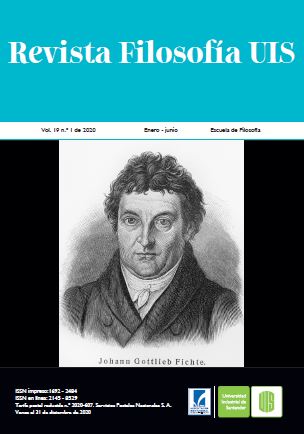Friedrich Schiller’s Aesthetic education: harmonize feeling and thinking
Published 2020-01-01
Keywords
- aesthetic education,
- aesthetic state,
- step back,
- beauty,
- freedom
How to Cite
Copyright (c) 2020 Revista Filosofía UIS

This work is licensed under a Creative Commons Attribution 4.0 International License.
Abstract
This article the current state of Schiller's Philosophical Letters as a critique of the education imparted by the culture of his time after the French Revolution and the Reign of Terror which, in its eagerness to cause the fragmentation of the faculties of humans, sensitivity and understanding, gave rise to savagery and barbarism. Facing this reality, this shows how Schiller proposed an aesthetic education aiming at forming human character. It is here where an approach emerges which proposes the need to step back from the physical state and into the aesthetic state, where the coercion that feeling and thinking exercise on humans is nullified by the reflection on beauty and art, which enables a reciprocal action between them and ultimately causes them to harmonize. The concept of aesthetic state is also highlighted as it enables the restoration of the humanity and freedom of mankind while also being a means to access moral, didactic and political ends. Even today, Schiller's thinking on the need to educate individuals aesthetically and morally in order to achieve a political transformation of the state still echoes because the latter will initially not produce free citizens.
Downloads
References
Beiser, F. (2018). El imperativo romántico. (N. Garnica y H. Tarragona, trads.). Madrid: Sequitur.
Berghahn, K. (2009). La revolución estética del Citoyen Schiller. En J. E. Brigitte y J. Rodríguez (eds.), El pensamiento filosófico de Friedrich Schiller (pp. 67-80). Valencia: Universidad de Valencia.
Eagleton, T. (2006). La estética como ideología. (G. Cano y J. Cano, trads.). Madrid: Trotta.
Fichte, J. G. (2005). Fundamento de toda la Doctrina de la Ciencia (1794). En J. Cruz Cruz (ed.). Pamplona.
Gámez-Millán, S. (2017). La imagen de Grecia en Schiller y Hölderlin: un horizonte utópico siempre por venir. Contrastes. Revista Internacional de Filosofía, XXII(2), 139-151.
Goethe, J. W. y Schiller, F. (2014). La más indisoluble unión. Epistolario Completo. 1745-1805. Madrid: Miño y Dávila.
Hegel, G. W. F. (2007). Lecciones sobre la Estética. (A. Brotóns Muñoz, trad.). Madrid: Akal.
Hölderlin, F. (1990). Correspondencia completa. (H. Cortés y A. Leyte, trads.). Madrid: Hiperión.
Hölderlin, F. (1998). Hiperión o el Eremita en Grecia. (J. Munárriz, trad.). Madrid: Hiperión.
Kant, I. (1991). Crítica de la Facultad de Juzgar. (P. Oyarzún, trad.). Caracas: Monte Ávila Editores.
Kant, I. y Foucault, M. (2015). ¿Qué es la Ilustración? (R. Jaramillo y A. Gabilondo, trads.). Medellín: Editorial Universidad de Antioquia.
Mader, M. (2012). Die Rolle der Kunst in den Briefen ,,Über die Ästhetische Erziehung des Menschen” von Friedrich Schiller. Mainz: Johannes Gutenberg-Universität Mainz.
Mendelssohn, M. (2009). Acerca de la pregunta: ¿A qué se llama ilustrar? En A. Maestre (comp.), ¿Qué es Ilustración? (pp. 11-16). Madrid: Tecnos.
Schiller, F. (1985). Sobre la gracia y la dignidad. Sobre poesía ingenua y poesía sentimental, y una polémica Kant, Schiller, Goethe, Hegel. Barcelona: Icaria.
Schiller, F. (1990). Kallias. Cartas sobre la educación estética del hombre. Barcelona: Ánthropos.
Schiller, F. (2017). Sobre lo sublime. En P. Aullón (ed.), Madrid: Casimiro libros.
Sharpe, L. (2005). Concerning Aesthetic Education. In S. Martinson (ed.), A Companion to the works of Friedrich Schiller (pp. 147-168). New York: Camden House.
Troncoso, J. F. (2008). Sobre lo bello y lo sublime: ideal estético e ideal moral en Schiller. En M. Acosta (ed.), Friedrich Schiller: estética y libertad (pp. 109-130). Bogotá: Universidad Nacional de Colombia.
